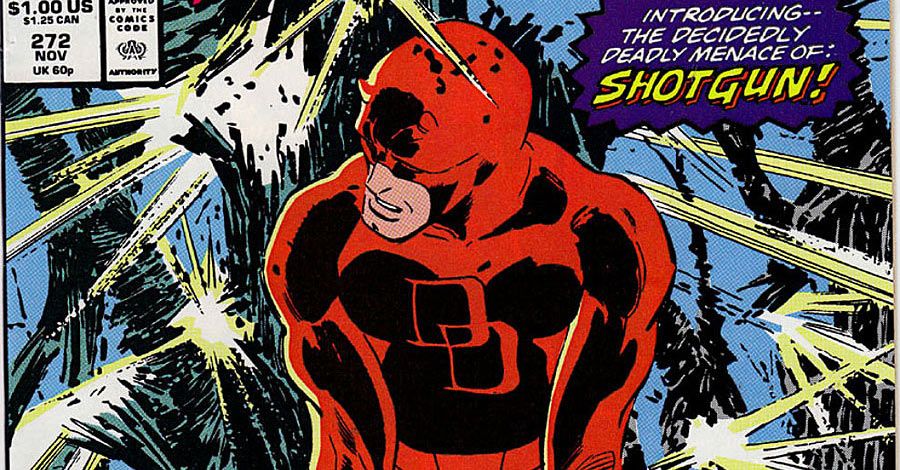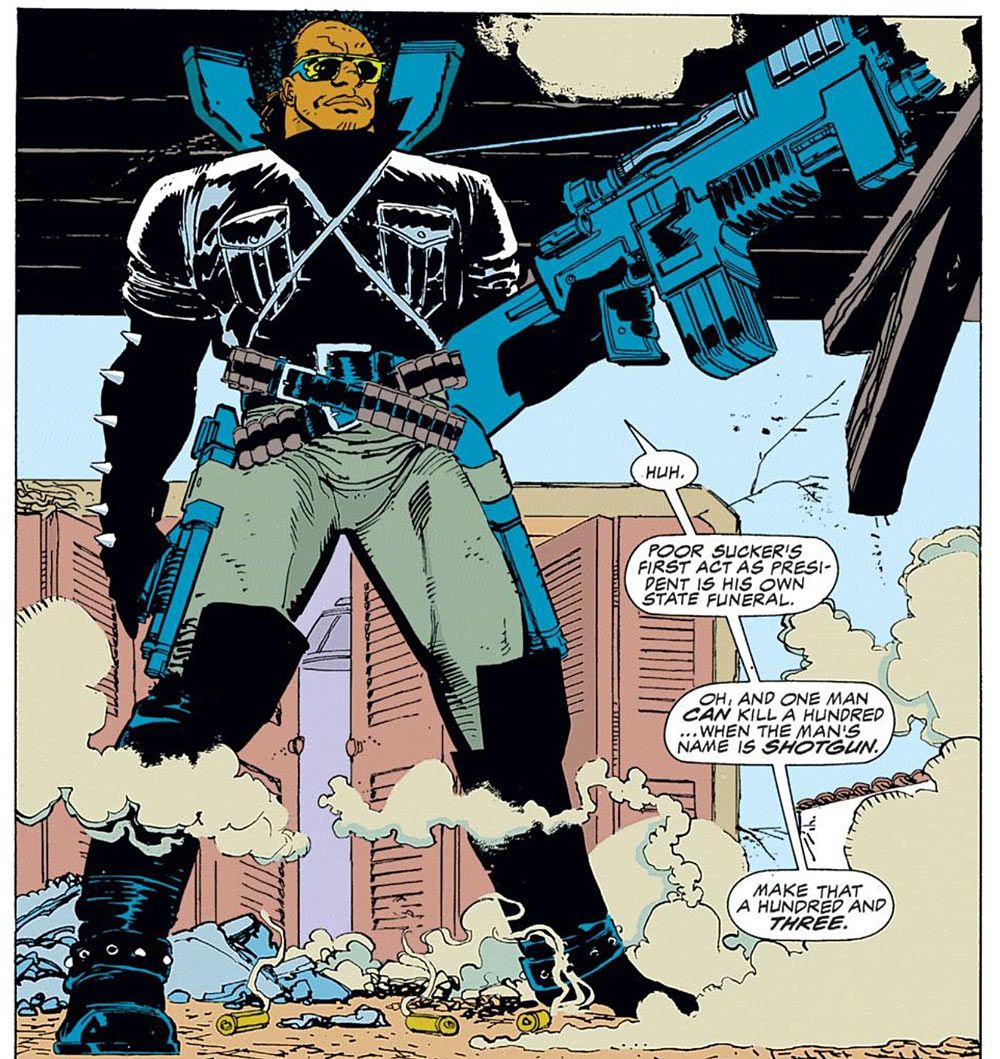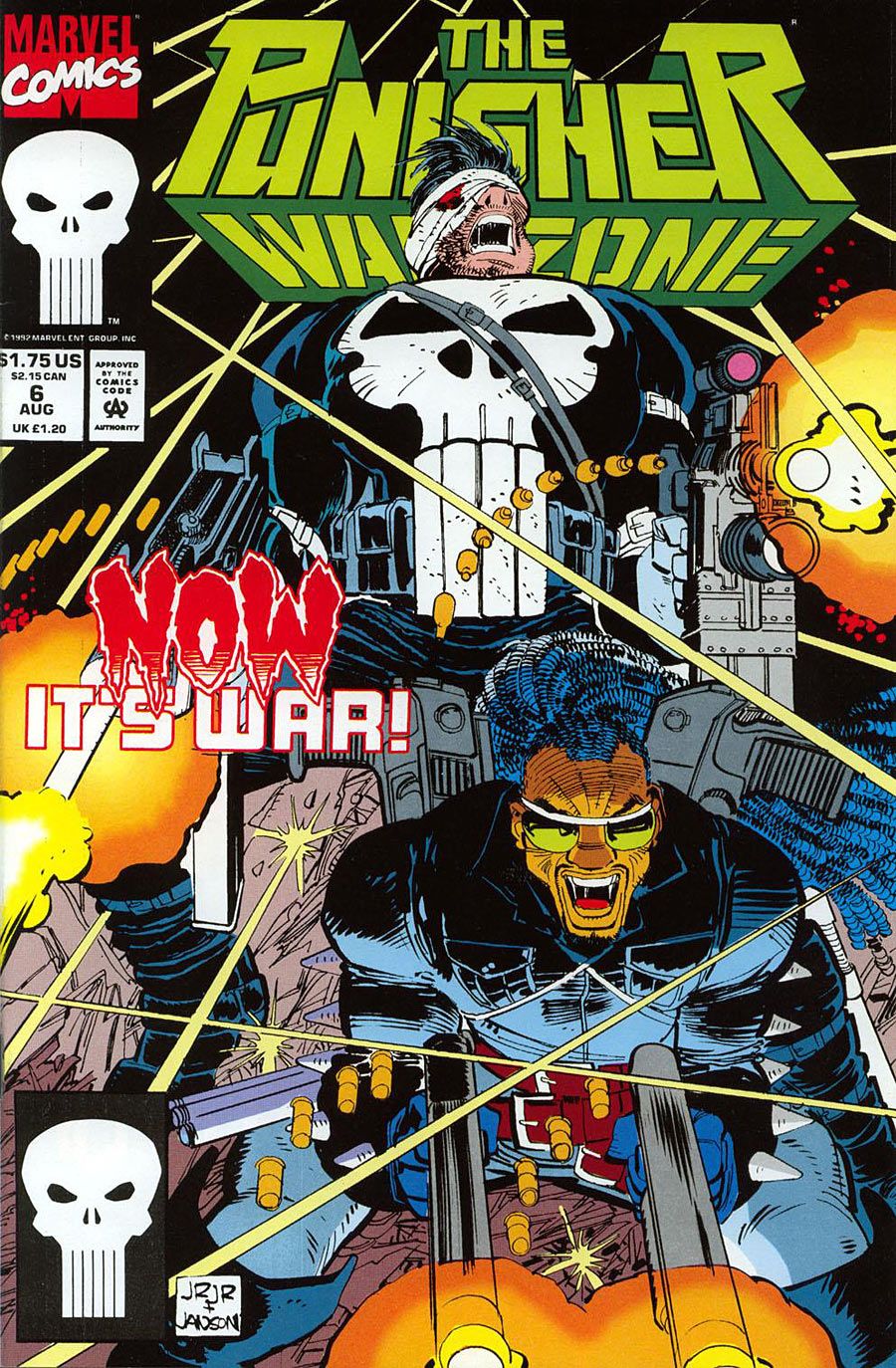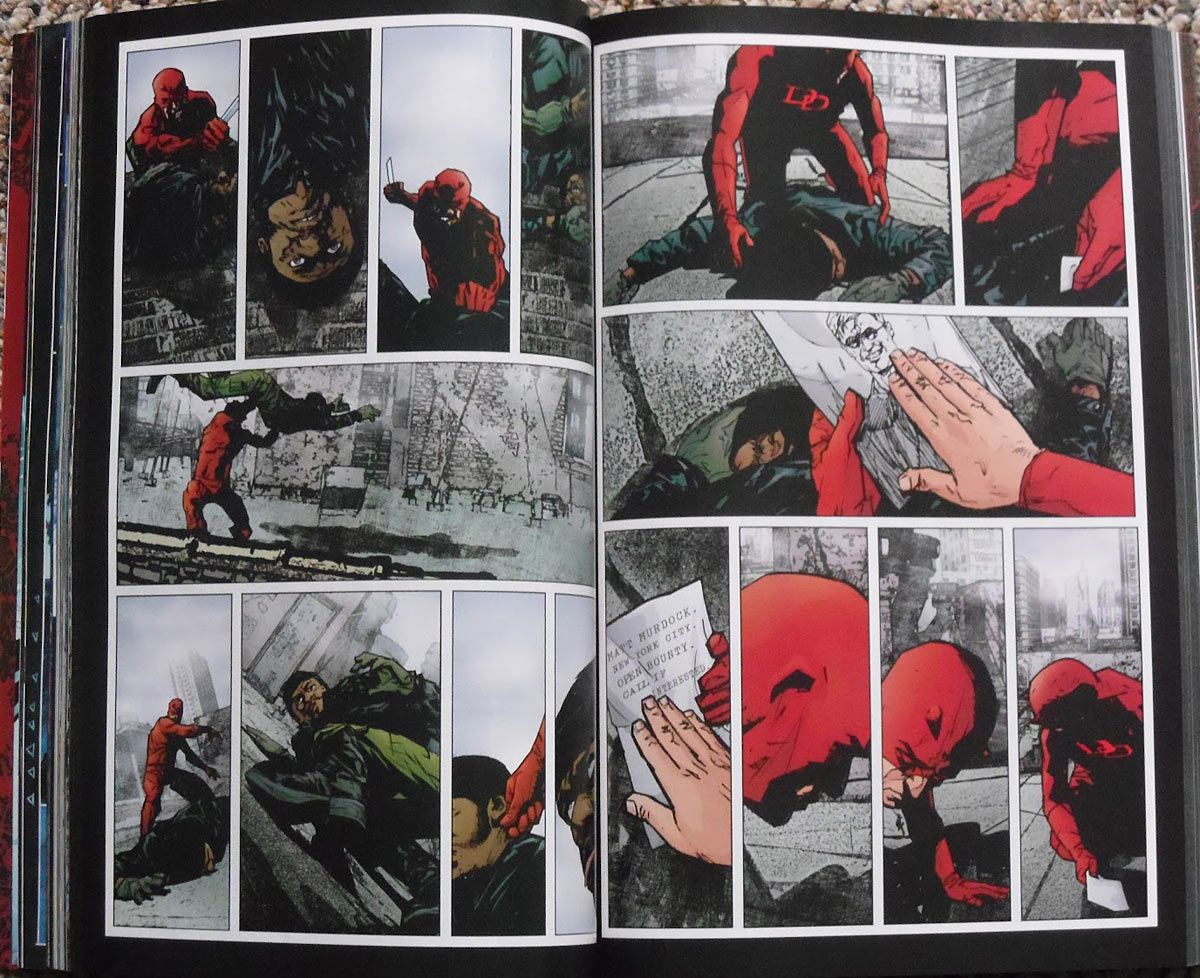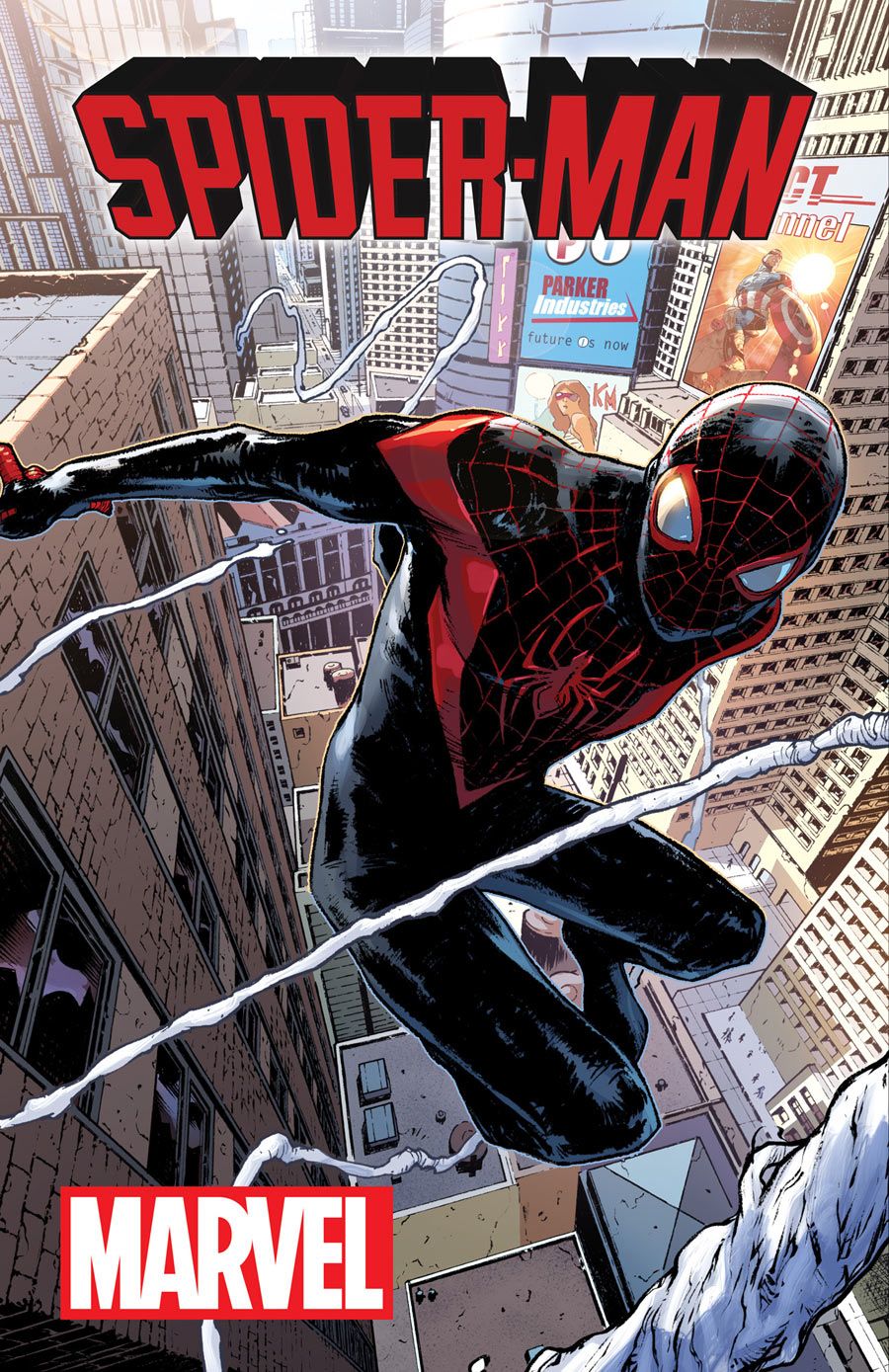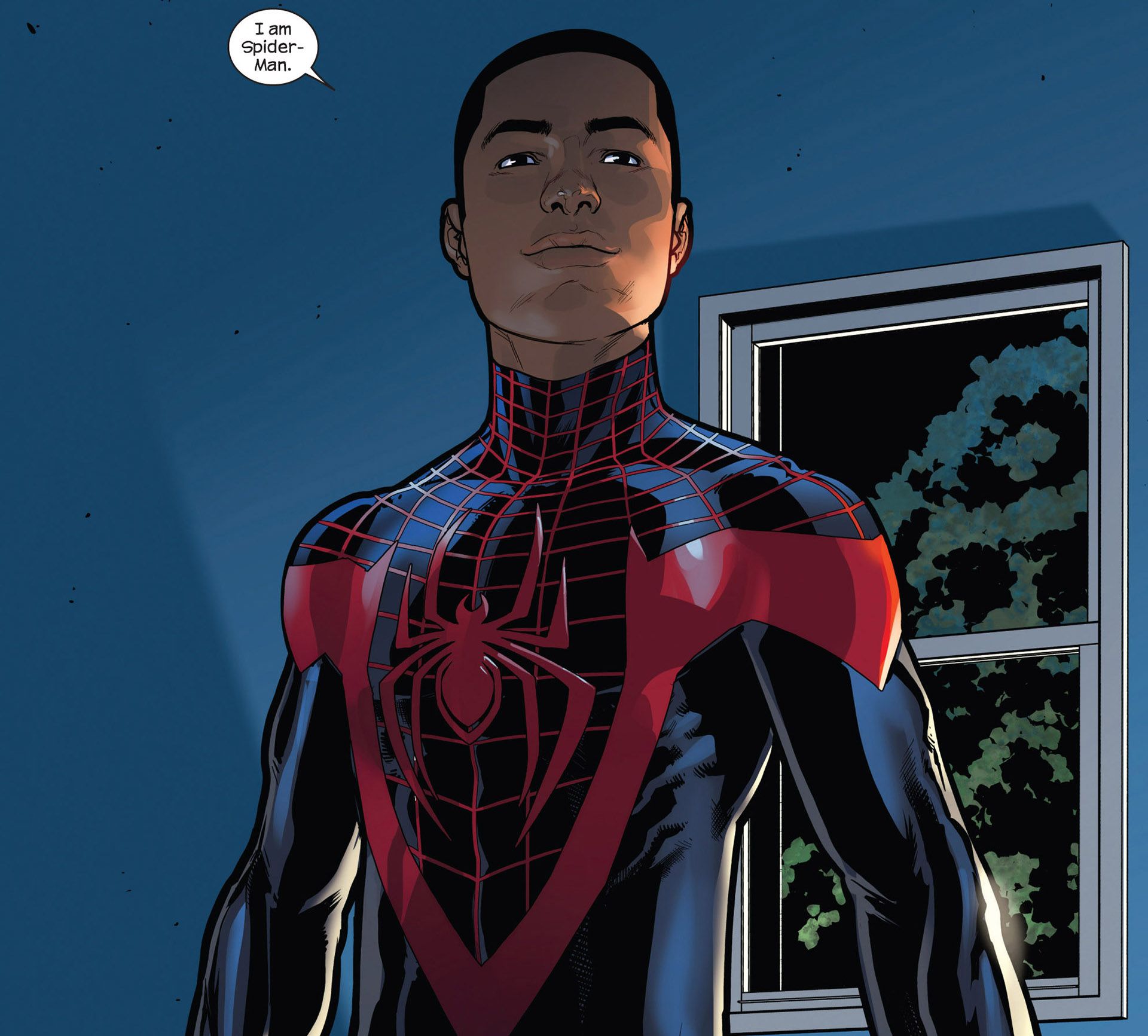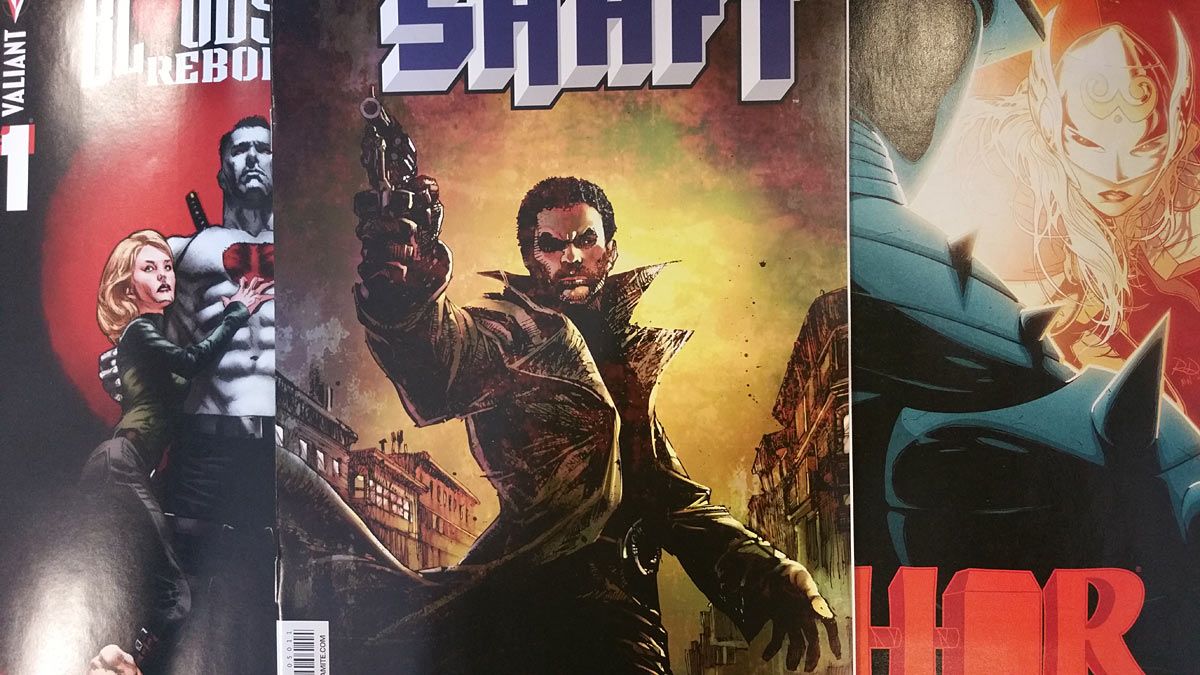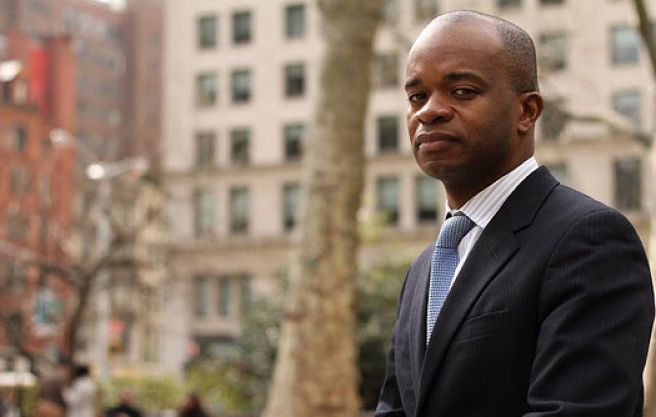In 1989, the character of Shotgun was introduced in the pages of Marvel Comics' "Daredevil," created by Ann Nocenti and John Romita, Jr.
Shotgun is a Black man who was an Army soldier and eventually became an assassin for the Central Intelligence Agency.
That's not an easy feat, and likely harder for a Black man because of the different standards by which we could expect him to be held.
Shotgun appeared again, and quite prominently, in the first arc of Marvel's "Punisher: War Zone" series, written by Chuck Dixon and illustrated again by John Romita, Jr. He was a massive man of presence, and loved to smile. The smile that revealed the confidence of a man who knew his formidability and loved his job.
Many years later, Shotgun reappeared in issue #28 of the second volume of "Daredevil," going up against the costumed hero after being hired to kill him. More specifically, being hired to kill attorney Matt Murdock (Daredevil in his secret identity at the time). This time, though, Shotgun looked significantly different.
No longer massive in stature or sporting his patented smile, Shotgun failed to kill Daredevil. Not only did he fail, but failed miserably. Daredevil took out this ex-military, C.I.A. assassin as if he was slightly better than a novice doing his first job.
As a fan of Shotgun, I remember feeling how the story did a disrespect to the character, using him as a foil instead of utilizing the character's past and capabilities to make him interesting.
Three and a half years later, in "Daredevil" #63, Daredevil is attacked by a White assassin, but this guy had a sonic device that overwhelmed Daredevil's superior senses. This guy was an assassin who used to work for S.H.I.E.L.D., an arm of the United States government.
Two killers-for-hire, both of whom worked for organizations created by the United States government but with authority and mandates for worldwide operations.
Now you think I'm going to say this is about race.
It is, but not in the way you may think.
I decided to examine the comparison of performance from the other point of view. Not that of the reader, but of the characters.
Why did Shotgun fail? A man with his wealth of experience and capabilities and reputation. Why did another man come closer to killing Daredevil than he did?
Because of overconfidence.
Shotgun believed that because of his abilities, he didn't need to do research. He didn't know Matt Murdock was Daredevil, but yet he went to Daredevil's hood and tried to kill someone. He should have known Daredevil would show up, and been ready for him.
But he wasn't ready. He didn't do research. He's a badass Black man with a gun, and that's enough to handle any challenge.
Overconfidence without research.
A few weeks ago, I attended the Special Edition: NYC convention. I was part of a panel called "Let's Talk About Checks: The Business of Professional Comics," in which I sat with creators Chris Sotomayor, Vera Greentea, Fernando Ruiz and Ulises Farinas. The panel was created and moderated by writer Alex de Campi, and made for a diverse group of experience, gender, and ethnicity.
After the panel, I ran into a Black creator who communicated his frustration about panels on diversity, how they appear to mostly profile the stars but not the soldiers wading through the muck of the battlefield.
I told him that no one of us "owned" diversity, and that The Cause was the most important thing. Anything that helps advance The Cause was good, and that he was letting the perceived oversight distract him from his personal goals and work.
We went on to discuss other conventions, conventions that profile creators of color, and how despite the best intentions, those conventions end up doing a disservice to various creators of color, as well.
And it made me think.
Some months back, I had a private Facebook correspondence with a Black writer whose work spans the major superhero publishing houses as well as independent houses, and we discussed the difficulty in getting consumers of color to buy something new from writers of color.
I told him about a conclusion I came to years ago, after standing in Midtown Comics in New York City on a Wednesday when the new comic books of the week arrived, and watching consumers of color at the racks.
Consumers of color, by and large, do not seem to be exceptionally loyal to creators of color or characters of color, or even the combination of the two.
I knew that in my gut for years, but seeing the words typed on my computer in this conversation, the thought hit me harder than ever before.
There is clearly a sense of mutual respect, cooperation, and solidarity within the online Black comic book community that encompasses various podcasts, weekly social media chats and columns.
Why doesn't that translate into the same level of mutual respect, cooperation and solidarity within the offline Black comic book community?
Why doesn't that translate into sales?
We could blame the Big Two American superhero comic book publishers, say they aren't hiring enough writers of color, editors of color, profiling enough characters of color, promoting works by writers of color or with characters of color to the same degree they do with non-POC characters and writers. We could say their actions influence the ethos of the entire business.
Some of that is true, but not all of it.
It doesn't represent the entire reason why the Black comic book community isn't respected by the powers-that-be as a sizable force of conviction and influence.
Maybe it's because we're fractured.
Fractured in that we will support other talented creators before we support talented Black creators, thus helping to maintain market share patterns across companies.
Fractured in that there are more of us outside of the mainstream than inside it, insofar as our product is not in most (if not all) comic book stores because it's not in the Diamond catalog that comic book store retailers use for ordering.
Fractured in that we will undermine each other sometimes, privately and in public, in petty ways that have nothing to do with emulating successful business models, and in no way promoting The Cause.
Fractured in that we make claim to wanting to challenge the system... but not always with work of a level of quality that can challenge the system. Furthermore, we will enable that lack of quality.
The combination of the above will never lead to success.
The collective Black comic book community is Shotgun.
In its overconfidence and bravado.
The iconic American superhero publishing system is Daredevil.
It will continue to marginalize and underestimate us as a group... until there is unification within the Black comic book community at every level of the ecosystem.
Creative.
Business.
Consumer.
On the creative level, we have to be at the top of our game. We have to help each other achieve formidable creative levels of ability, and a diversified library of content. Content reflecting life and cultures within and outside of our experience.
On the business level, we have to understand how it works from top to bottom, and not just in our own area of expertise. Know the players in the different strata of the industry, and how they work together.
We have to help each other navigate through that structure.
On the consumer level, we can no longer make excuses for not buying work from that talented Black writer while continuing to buy work from that equally or less-talented non-POC writer.
We have to break the pattern of exclusive support for others. Support must be well-rounded in creator choices.
Michael Davis, creator of The Black Panel and Co-Founder of Milestone Media, Inc., wrote a column in which he pointed out that the Black community needs to start controlling its brand.
That brand must be founded on solidarity, if it is to flourish and reach its full potential.
Miles Morales to Star in Bendis & Pichelli's "Spider-Man" Post-"Secret Wars"
On Saturday, June 20, Marvel Comics announced an all-new monthly series called "Spider-Man" starring Miles Morales, the Black/Latino Spider-Man.
One day earlier, the public leak of a confidential licensing document by Sony Pictures, the studio with partial film rights of the Spider-Man franchise, revealed that Peter Parker -- the on-screen Spider-Man in every live-action iteration, including in the character's imminent Marvel Cinematic Universe debut -- cannot be Black.
That's not our brand.
Our brand will acknowledge us across all media, not selectively.
The Black comic book community brand is the combination of the best that we have produced, and the best that we have coming around the corner, and the best to follow after that.
In comics and beyond. In America and beyond.
The same goes for the Asian comic book community.
The Latino comic book community.
All communities of color.
Each one must own and raise its brand to the pinnacle, and keep it there.
Once all of the brands support each other and put forth the best of what they have each time, every time, across different forms of media... that's when our conviction will manifest into our collective influence.
That's when the comic book industry will be compelled to emulate the heroic ideals of the characters within its pages.
Diversity is not the issue. We can see diversity of characters and people within the fiction and business circles every day.
Equality is what the present is missing, and the future should hold.
That's "The Cause" of which I speak.
Joseph Phillip Illidge is a public speaker on the subjects of race, comics, and the corporate politics of diversity. In addition to his coverage by the BBC and Publishers Weekly, Joseph has been a speaker at John Jay College of Criminal Justice, Digital Book World's forum, Digitize Your Career: Marketing and Editing 2.0, Skidmore College, Purdue University, on the panel "Diversity in Comics: Race, Ethnicity, Gender and Sexual Orientation in American Comic Books" and at the Soho Gallery for Digital Art in New York City.
Joseph is the Head Writer for Verge Entertainment, a production company co-founded with Shawn Martinbrough, artist for the graphic novel series "Thief of Thieves" by "The Walking Dead" creator Robert Kirkman, and video game developer Milo Stone. Verge has developed an extensive library of intellectual properties for live-action and animated television and film, video games, graphic novels, and web-based entertainment.
His graphic novel project, "The Ren," about the romance between a young musician from the South and a Harlem-born dancer in 1925, set against the backdrop of a crime war, will be published by First Second Books, a division of Macmillan.
Joseph's newest comic book project is the upcoming Scout Comics miniseries "Solarman," a revamp of a teenage superhero originally written by Stan Lee.

